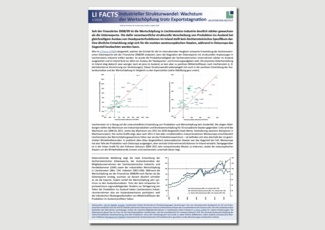Structural change in Liechtenstein’s industry
As already described in LI Focus 2/2024, which analyzes the reasons for the weak growth of Liechtenstein’s goods exports since the 2008/09 financial crisis in an international comparison, the stagnation of Liechtenstein’s goods exports can be explained by structural adjustments in Liechtenstein’s industry. The production activities of Liechtenstein companies have been expanded more abroad, while at home there has been an expansion of headquarters and research activities in particular. Although the physical production of goods in Liechtenstein increased less than abroad as a result, foreign production led to positive cash flows back to Liechtenstein (e.g. internal accounting of intermediate consumption).
This structural change is also reflected in the positive development of foreign sales and industrial value added in Liechtenstein compared to the weak growth in export figures, as shown by LI Facts 2/2024. The European comparison of the development of industrial production and value added in industry reveals that Liechtenstein is not a special case in terms of the different development of production and value added. In almost all “traditional” industrialized nations in Western Europe, including Liechtenstein, industrial value added growth was higher than production growth after 2011, while the opposite was the case in practically all Eastern European countries. Western Europe has therefore outsourced parts of its production to Eastern Europe, but has strengthened central corporate functions at home.









